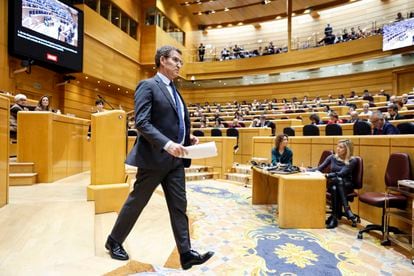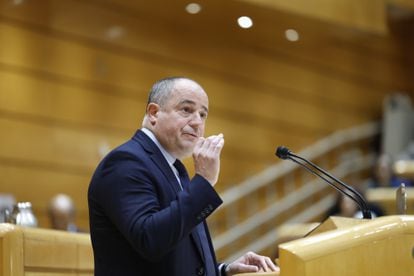The third reform of the Constitution in 45 years illustrated this Tuesday the spiral of contradictions in which Spanish politics is often entangled. After five years stuck, largely due to the PP's reluctance to touch anything in the Fundamental Law, the reform of article 49 to change the term “disabled” to “people with disabilities” will be processed through the emergency procedure. at the request of the PP itself. In the most acrimonious political climate in memory since the end of the dictatorship, sweet songs were sung in the chamber to extol the virtues of consensus, especially in the mouths of the two major parties that daily wage an all-out battle. The project passed the first step, that of taking it into consideration, with the only dissonance being Vox, which abstained from the support of all the others.
The plenary session of Congress to approve the first step of the very slight constitutional reform began with surprise. In defense of the project, the leader of the PP in person stood on the Senate platform – the headquarters of the lower house is still under construction. His party, under the mandate of Pablo Casado, had blocked the reform, demanded insistently for years by the groups of affected people, under the argument that not a single comma of the Fundamental Law could be touched so as not to satisfy the independence movement. not even with the mere objective of replacing a word that those affected consider offensive.
Alberto Núñez Feijóo corrected that position and agreed on December 22 with President Pedro Sánchez to launch the reform. He did demand, however, the express procedure, in order to not give room for peripheral nationalists to put their demands on the table. And this Tuesday he emerged as the great architect of the project. Feijóo made his intention very clear: despite the fact that he continues to block the reform of the Judiciary, despite the anti-democratic purposes that he attributes to the Government on a daily basis, despite his commitment to continuous mobilization in the streets, the leader of the PP He wanted to show himself as a man of consensus. A leader who advocates for great agreements like this, in which “politics takes flight over the daily fray and personal interests”, in which “an oasis is discovered in the desert of tension that some have chosen.”
At the same time, Feijóo wanted to make it clear that the withdrawal of the “anachronistic” term disabled is just a sample of his party's commitment to the validity of the Fundamental Law. The leader of the PP divided the Spanish political map into three sides according to his attitude towards her. And although he did not give names, he also left no doubt as to who he was referring to: those who want to “break it” (the Government's partners), those who “mock it” (the Government itself) and those who “defend it” (his party). .

What affects the most is what happens closest. So you don't miss anything, subscribe.
Subscribe
The Executive avoided returning its tacit reproaches to Feijóo. And at times they even seemed to hear chords of the old melody of bipartisanship. The Minister of the Presidency, Félix Bolaños, also praised the wonders of consensus and highlighted that this small reform serves “to enhance our Constitution.” “We would like this to be the first of the big agreements. This is one of those moments that justify a legislature,” stated Bolaños to close the debate.
Most groups focused on defending the reform as an “act of justice” and considering it a step towards achieving full equality for people with disabilities. In the middle, and somewhat in passing, ERC, Junts, PNV, Podemos or BNG planted some allusions to the need, according to them, to abandon the “taboo” of constitutional reforms. “We have a frozen Constitution,” said Francesc Marc Álvaro, from ERC, who highlighted that this retouching of article 49 shows that “the passage of time impacts the laws and their validity.” “The German Constitution has been touched 60 times and the leadership of the Reichstag has not exploded,” said Noemí Santana, from Podemos, ironically. Despite this, groups such as ERC and EH Bildu announced their resignation from presenting amendments proposing other reforms to the Fundamental Law, contrary to what the PNV will do.
Some complaints arose—for example, from the Peneuvista Mikel Legarda—because the reform was proposed as a purely bipartisan initiative. The nationalists even agreed with Vox on that. For the rest, the extreme right once again placed itself in a redoubt on the sidelines and detonated its usual pyrotechnics of disqualifications, from unworthy to miserable. Its deputy Lourdes Méndez Monasterio presented the thesis that people with disabilities have been used as “merchandise” to “whitewash the existence of a continuous blow to our rule of law.”

The most emotional moments were led by the socialist Emilio Sáez, former mayor of Albacete and with a past career as a successful Paralympic athlete. Sáez, who suffered polio as a child, recounted the successive names that official documents have given him throughout his life: “subnormal” in the seventies, “invalid” in the eighties, “handicapped” in the nineties… Both he and Lander Martínez, from Sumar, recalled that people with disabilities make up to 10% of the population.
Six days ago, after the stormy debate for the approval of three government decrees, the chamber was a pressure cooker. This Tuesday the plenary session ended with the deputies of the Government and the PP turning towards the tribune to applaud the affected groups. There everything was excitement and congratulations. Some expressed with words and others with sign language.
Subscribe to continue reading
Read without limits
_
#PSOE #open #constitutional #reform #praise #political #consensus
